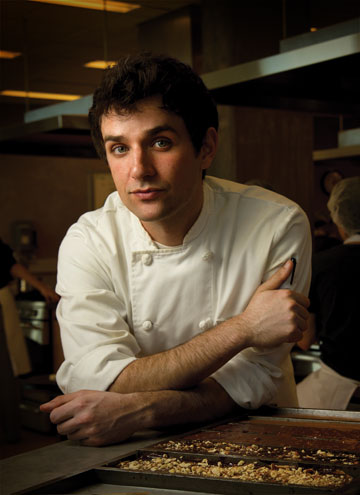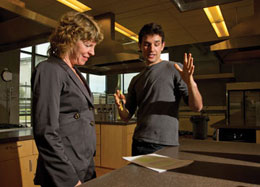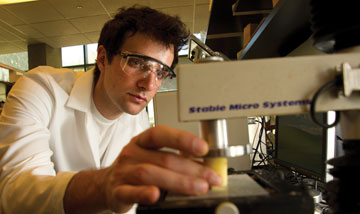Volume 30 · Number 3 · Spring 2013
Recipe for a food-science fusion

Ali Bouzari
(Gregory Urquiaga/UC Davis)
Plenty of scientists like to cook. And most chefs appreciate the science behind their culinary creations.
But what happens when one person combines his passion for food with his love of science? The result is a powerful food-science fusion, personified by graduate student Ali Bouzari, who stood in his lab one recent day at the UC Davis Department of Food Science and Technology, dicing Yukon Gold potatoes into tiny cubes.
“I guess I’m a hybrid — not a scientist or chef, but both,” said Bouzari, his words and knife blade flying. “Here at UC Davis, I’ve found the best of both worlds.”
UC Davis has been advancing food science for decades, helping industry, chefs and consumers produce and prepare safe, tasty, nutritious meals. But developing scientist-chef hybrids like Bouzari is new, the product of closer ties between the culinary and science worlds and of the passion that students like Bouzari bring to the table. How is this kind of fusion changing the science and culinary worlds?
Let’s get the recipe from Bouzari, who has time to talk (another of his passions) as he prepares potatoes for an experiment with sous vide, a method of cooking food with precision temperature control. Bouzari’s love for food and science is so contagious you want to pick up a knife and start dicing along with him.
How to make a food-science fusion
Ingredients (serves many):
- One heaping cup of heritage
- Several years experience
- Healthy dose of exposure, diced
- Dash of inspiration
- Plenty of passion
Directions:
Blend all ingredients under the ideal conditions of a UC Davis food science graduate program.
About the ingredients
Heritage: Food is a big deal in Bouzari’s family. His late father, Bijan, was from Iran and loved to cook. So does his mother, Louise, who is from central Texas.
“Persian food, beef brisket, pecan pie, you name it,” Bouzari said. “My whole family is obsessed with food.”
Science, too, is important to the Bouzari clan. When Bouzari enrolled at the University of Texas at Austin in 2006, he selected biochemistry as his major.
“I knew I would change what I wanted to do a bazillion times and I knew biochemistry would give me a gigantic foundation to support wherever I landed.”
Experience: Bouzari worked in catering during high school in Denver. In college, he had several food industry jobs, including stints as a line cook and a cheese monger at an artisan cheese shop in Austin — “the coolest thing ever.” He also worked one summer as a research assistant in a biochemistry lab at the University of Colorado.
Exposure: Beyond the culinary skills he learned at home, Bouzari was exposed to the avant-garde food movement during a year abroad in Spain in 2009.
“That’s when it really came together for me,” Bouzari said. “Tapas bars were everywhere, serving small plates of awesome food. Fine cooking was about skill and finesse, not some secret ingredient. Chefs were more open and collaborative. The movement embraced an analytical mindset — almost a research and development approach — where you could spend months developing the perfect texture, taste and presentation.”
Inspiration: Bouzari didn’t love his job as a biochemistry research assistant.
“I’d pour different proteins, sugars, whatever, into beakers and then read numbers to tell me whether something happened,” he said. “I was looking for something with more immediate relevance to the real world.”
He liked his work as a line cook, but that wasn’t his dream job, either.
“A teacher once told me to imagine the perfect job, and I said I wanted to be the science guy that helps the best chefs in the world do stuff,” Bouzari said. “I think what I really wanted was to be both the scientist and chef, but I wasn’t sure what that would look like or how I would get there.”
And then, inspiration struck.

Faculty member Diane Barrett and student Ali Bouzari discuss his research at the Robert Mondavi Institute for Wine and Food Science.
(Gregory Urquiaga/UC Davis)
“I woke up at 6 a.m. one day and Googled ‘food, biochemistry and Ph.D.’,” Bouzari said. “UC Davis was one of the top hits. I knew Davis had an excellent food science program and was located near the Culinary Institute of America in St. Helena. I knew that’s where I wanted to be.”
Passion: Bouzari perused the food science research going on at UC Davis to see whose lab would be the best fit. High on his list was Diane Barrett, a Cooperative Extension specialist in the Department of Food Science and Technology. Barrett and her team address the effects of raw material quality and processing on color, flavor, texture and nutritional quality of fruit and vegetable products. Bouzari set up an appointment with Barrett and flew to UC Davis (on his own dime) to meet her.
“Ali did his homework,” Barrett recalled. “He had read all our research papers and understood what we did and what he could offer.”
Barrett said she was impressed with his experience and his passion: “You don’t often see people with his science experience on top of his culinary background. And his passion and enthusiasm were clear from the start. Ali is a unique bundle of energy, passion and joy.”
So what do you do with all those ingredients? If you’re lucky to land at UC Davis, Bouzari said, you mix them with all the university has to offer — innovative faculty, state-of-the-art equipment and crucial collaborations.
“The collaboration began right away,” Bouzari said. “I started in summer 2011 and, before I arrived, Diane connected me with a colleague of hers who is the head of education at the CIA [Culinary Institute of America] in St. Helena. He offered me a job teaching there.”
So in addition to his research and studies, Bouzari is an adjunct faculty member in the institute’s Department of Culinary Science and a science guy who answers chefs’ questions like, ‘How do I make vinegar out of elderberries?’ and ‘Does trussing chicken really improve the roasting process?’ Bouzari also helps design curriculum and contributes to professional development classes at the institute’s Hyde Park campus in upstate New York.
Bouzari is also collaborating with the frozen food industry (along with Barrett and other UC Davis researchers) to compare the nutrient values in freshly frozen produce — strawberries, blueberries, carrots, spinach, green beans, broccoli and corn — with the nutrients in fresh versions stored under different conditions.
In the meantime, Bouzari is spreading the gospel of good food. He organizes monthly workshops for food science graduate students where he or another teacher presents a culinary skill like roasting a chicken, baking a pie or making pickles.
“I call it ‘edutainment,’” Bouzari said. “It’s cool because the students have a good understanding of the fundamental science and this helps them see how fun it is to apply the science to a good meal.”
That’s Bouzari in a nutshell — using science to make traditional foods better. He’s not impressed with anchovy foam or smoked lychee, especially if the chef overcooks the meal’s main feature.
“Making mango juice into a sphere is simple compared to roasting a chicken or making a soufflé,” Bouzari said. “Magic tricks won’t get you anywhere if you don’t know how to cook good food.”
That takes us back to Bouzari’s diced potatoes which he’s now weighing in tiny tins. For phase one of his Ph.D. research, Bouzari is evaluating potatoes — trying to control for all their variables — to better understand how precision temperature control, or sous vide, affects their texture and taste.

Ali Bouzari tests the texture of a potato in a food lab at the Robert Mondavi Institute for Wine and Food Science.
(Gregory Urquiaga/UC Davis)
With sous vide, chefs seal food in air-tight plastic bags and cook it in a water bath set to an exact temperature that keeps the food’s internal heat at that same precise temperature.
“It’s the biggest thing to happen to food since man discovered fire,” Bouzari said with a smile. “OK, maybe not that big, but it’s incredibly important. For one thing, we can now dominate sub-boiling temperatures.”
You can dial in, for example, the precise degree at which an egg white will set and its yolk will stay liquid. Meat can be cooked to medium rare, end to end.
“So far, sous vide has been explored mainly for food safety and with meat, dairy and eggs,” Bouzari said. “No one has really looked at the biochemistry with fruits and vegetables to see how precision-temperature cooking affects texture and taste.”
Bouzari chose potatoes because they’re relatively homogenous (compared with, say, a tomato) and they’re important to the food industry and culinary world.
“But there are still a lot of variables depending on variety, age, storage and even what part of the potato you’re working with,” Bouzari said. “My first step is trying to correct for the variables.”
Working with core and exterior samples of Yukon Gold potatoes, Bouzari will weigh the cubes, mix them in a blender, put them in a vacuum oven to remove the moisture and weigh them again.
“How much of the potato is solids — sugar, protein, starch, etc. — and how much is water?” Bouzari asks. “The answer will have a huge effect on how it cooks.”
Barrett said students like Bouzari are strengthening UC Davis’ links among the science, food and culinary worlds.
“There’s a lot of synchronicity,” Barrett said. “Restaurants hire scientists to work alongside their chefs. Food companies hire chefs to help create new products.”
And science appreciates the empirical knowledge the culinary world brings to the equation.
“Chefs have a lot to share because they work with food day in and day out,” Bouzari said.
All this food-science fusion is helpful, too, to workaday cooks who have plenty of questions of their own. Speaking of which, does trussing chicken really improve the roasting process?
“I’m not a fan of trussing a chicken,” Bouzari said. “I think chicken cooks better when more of its skin is exposed to the heat. But in terms of a scientific analysis, that question has yet to be answered.”
Someday soon, a foodie scientist will discover the cold, hard, tasty facts.
